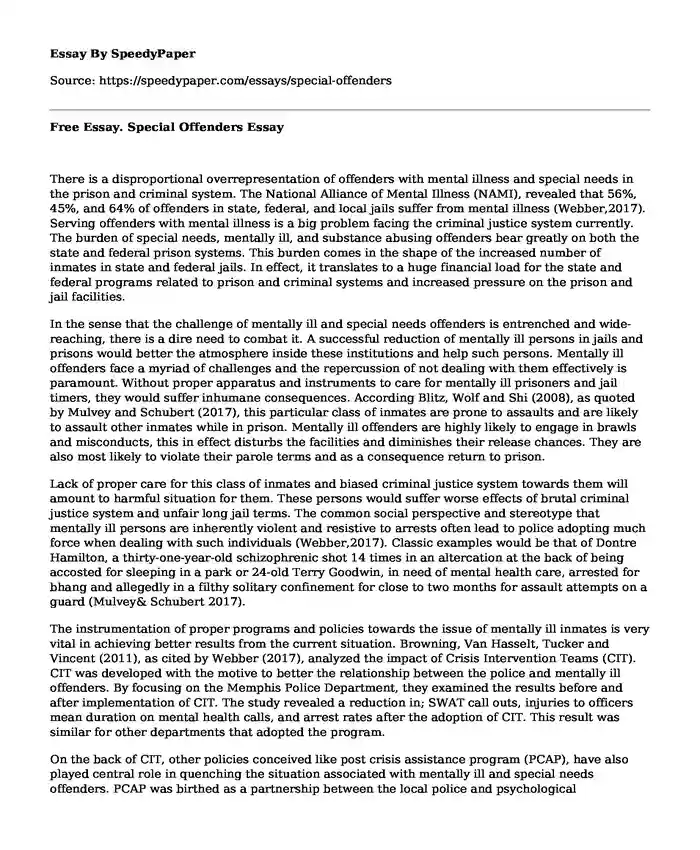
| Type of paper: | Essay |
| Categories: | Penal system Criminal justice Mental disorder Social issue |
| Pages: | 3 |
| Wordcount: | 712 words |
There is a disproportional overrepresentation of offenders with mental illness and special needs in the prison and criminal system. The National Alliance of Mental Illness (NAMI), revealed that 56%, 45%, and 64% of offenders in state, federal, and local jails suffer from mental illness (Webber,2017). Serving offenders with mental illness is a big problem facing the criminal justice system currently. The burden of special needs, mentally ill, and substance abusing offenders bear greatly on both the state and federal prison systems. This burden comes in the shape of the increased number of inmates in state and federal jails. In effect, it translates to a huge financial load for the state and federal programs related to prison and criminal systems and increased pressure on the prison and jail facilities.
In the sense that the challenge of mentally ill and special needs offenders is entrenched and wide-reaching, there is a dire need to combat it. A successful reduction of mentally ill persons in jails and prisons would better the atmosphere inside these institutions and help such persons. Mentally ill offenders face a myriad of challenges and the repercussion of not dealing with them effectively is paramount. Without proper apparatus and instruments to care for mentally ill prisoners and jail timers, they would suffer inhumane consequences. According Blitz, Wolf and Shi (2008), as quoted by Mulvey and Schubert (2017), this particular class of inmates are prone to assaults and are likely to assault other inmates while in prison. Mentally ill offenders are highly likely to engage in brawls and misconducts, this in effect disturbs the facilities and diminishes their release chances. They are also most likely to violate their parole terms and as a consequence return to prison.
Lack of proper care for this class of inmates and biased criminal justice system towards them will amount to harmful situation for them. These persons would suffer worse effects of brutal criminal justice system and unfair long jail terms. The common social perspective and stereotype that mentally ill persons are inherently violent and resistive to arrests often lead to police adopting much force when dealing with such individuals (Webber,2017). Classic examples would be that of Dontre Hamilton, a thirty-one-year-old schizophrenic shot 14 times in an altercation at the back of being accosted for sleeping in a park or 24-old Terry Goodwin, in need of mental health care, arrested for bhang and allegedly in a filthy solitary confinement for close to two months for assault attempts on a guard (Mulvey& Schubert 2017).
The instrumentation of proper programs and policies towards the issue of mentally ill inmates is very vital in achieving better results from the current situation. Browning, Van Hasselt, Tucker and Vincent (2011), as cited by Webber (2017), analyzed the impact of Crisis Intervention Teams (CIT). CIT was developed with the motive to better the relationship between the police and mentally ill offenders. By focusing on the Memphis Police Department, they examined the results before and after implementation of CIT. The study revealed a reduction in; SWAT call outs, injuries to officers mean duration on mental health calls, and arrest rates after the adoption of CIT. This result was similar for other departments that adopted the program.
On the back of CIT, other policies conceived like post crisis assistance program (PCAP), have also played central role in quenching the situation associated with mentally ill and special needs offenders. PCAP was birthed as a partnership between the local police and psychological organizations with the motive to ensure that persons with the experience of crisis situation get the proper deserved after care. It proved instrumental by reducing the calls for service relating to mental health. It also proved vital by reducing chances of arrests after involvements with it. Mental health courts have also become key instruments nationally in scaling down recidivism related with mentally ill offenders. A study by Marlee Moore and Virginia Hiday in 2006 revealed that participation in mental health courts ( MHC) had positive impact on recidivism and reduction of severity of crimes committed by individuals who took part in the program.
References
Mulvey, E. P., & Schubert, C. A. (2017). Mentally ill individuals in jails and prisons. Crime and justice, 46(1), 231-277. https://doi.org/10.1086/688461
Webber, R. J. (2017). Criminal Justice System's Approach to Offenders with Mental Illness. Retrieved from http://www.lcsc.edu/media/5006584/Webber-JS-499-Final-ResearchPaper-2017.pdf
Cite this page
Free Essay. Special Offenders. (2023, Mar 22). Retrieved from https://speedypaper.com/essays/special-offenders
Request Removal
If you are the original author of this essay and no longer wish to have it published on the SpeedyPaper website, please click below to request its removal:
- Free Essay on Gentrification: Urban Displacement and Unaffordable Cost of Living
- Essay Example with Summary of Next-Generations Firewalls for Dummies
- Free Essay Sample on the Impact of Tourism in Cambodia and Japan
- Are Vampires for Real? Our Essay Example Answers
- Essay Sample on Mona Lisa by Leonardo da Vinci and Eiffel Tower Architecture Works
- Essay Sample on Divorce Rates around the World
- Essay Example on Social, Cultural, Political, and Economic Fallouts of WWI
Popular categories




